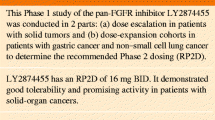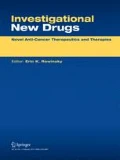Summary
Background Preclinical studies suggest that imatinib resistance in gastrointestinal stromal tumor (GIST) can be mediated by MAP-kinase activation via fibroblast growth factor (FGF) signaling. In FGF stimulated GIST cell lines, BGJ398, a pan-FGFR kinase inhibitor in combination with imatinib, was cytotoxic and superior to imatinib therapy alone. In FGF-dependent GIST, the combination of BGJ398 and imatinib may provide a mechanism to overcome imatinib resistance. Methods This phase Ib study of BGJ398 and imatinib was performed in patients with imatinib refractory advanced GIST. A standard 3 + 3 dosing schema was utilized to determine the recommended phase II dose (RP2D). Two treatment schedules were evaluated incorporating imatinib 400 mg daily in combination with (A) BGJ398 daily 3 weeks on, 1 week off or (B) BGJ398 daily 1 week on, 3 weeks off. Results 16 patients enrolled. The median age was 54 years (range: 44–77), 81% were male, and the median number of lines of prior therapy was 4 [range: 2–6, 13 patients had ≥3 prior therapies]. 12 patients received treatment on schedule A [BGJ398 dose range: 25 – 75 mg]: 2 patients experienced dose limiting toxicities (DLT) (n = 1, myocardial infarction & grade (G)4 CPK elevation; n = 1, G3 ALT elevation) on schedule A (BGJ398 75 mg), significant hyperphosphatemia, an on-target effect, was not observed, implying the maximum tolerated dose was below the therapeutic dose. Following protocol amendment, 4 patients enrolled on schedule B [BGJ398 dose range: 75 − 100 mg]: no DLTs were observed. The most common treatment related adverse events occurring in >15% of patients included CPK elevation (50%), lipase elevation (44%), hyperphosphatemia (24%), anemia (19%), and peripheral edema (19%). Among the 12 evaluable patients, stable disease (SD) was the best response observed in 7 patients by RECIST v1.1 and 9 patients by CHOI. Stable disease ≥ 32 weeks was observed in 3 patients (25%). Median progression free survival was 12.1 weeks (95% CI 4.7–19.5 weeks). Conclusions Toxicity was encountered with the combination therapy of BGJ398 and imatinib. Due to withdrawal of sponsor support the study closed before the RP2D or dosing schedule of the combination therapy was identified. In heavily pre-treated patients, stable disease ≥ 32 weeks was observed in 3 of 12 evaluable patients. Trial Registration: NCT02257541.


Similar content being viewed by others

References
Demetri GD, Von Mehren M, Blanke CD et al (2002) Efficacy and safety of imatinib mesylate in advanced gastrointestinal stromal tumors. N Engl J Med 347:472–480
Verweij J, Casali PG, Zalcberg J et al (2004) Progression-free survival in gastrointestinal stromal tumours with high-dose imatinib: randomised trial. Lancet 364:1127–1134
Blanke CD, Rankin C, Demetri GD, Ryan CW, von Mehren M, Benjamin RS, Raymond AK, Bramwell VHC, Baker LH, Maki RG, Tanaka M, Hecht JR, Heinrich MC, Fletcher CDM, Crowley JJ, Borden EC (2008) Phase III randomized, intergroup trial assessing imatinib mesylate at two dose levels in patients with unresectable or metastatic gastrointestinal stromal tumors expressing the kit receptor tyrosine kinase: S0033. J Clin Oncol 26:626–632
Demetri GD, Reichardt P, Kang YK et al (2013) Efficacy and safety of regorafenib for advanced gastrointestinal stromal tumours after failure of imatinib and sunitinib (GRID): an international, multicentre, randomised, placebo-controlled, phase 3 trial. Lancet 381:295–302
Demetri GD, Van Oosterom AT, Garrett CR et al (2006) Efficacy and safety of sunitinib in patients with advanced gastrointestinal stromal tumour after failure of imatinib: a randomised controlled trial. Lancet 368:1329–1338
Antonescu CR, Besmer P, Guo T, Arkun K, Hom G, Koryotowski B, Leversha MA, Jeffrey PD, Desantis D, Singer S, Brennan MF, Maki RG, DeMatteo R (2005) Acquired resistance to imatinib in gastrointestinal stromal tumor occurs through secondary gene mutation. Clin Cancer Res 11:4182–4190
Heinrich MC, Corless CL, Blanke CD, Demetri GD, Joensuu H, Roberts PJ, Eisenberg BL, von Mehren M, Fletcher CDM, Sandau K, McDougall K, Ou WB, Chen CJ, Fletcher JA (2006) Molecular correlates of imatinib resistance in gastrointestinal stromal tumors. J Clin Oncol 24:4764–4774
Wardelmann E, Thomas N, Merkelbach-Bruse S, Pauls K, Speidel N, Büttner R, Bihl H, Leutner CC, Heinicke T, Hohenberger P (2005) Acquired resistance to imatinib in gastrointestinal stromal tumours caused by multiple KIT mutations. Lancet. Oncol 6:249–251
Javidi-Sharifi N, Traer E, Martinez J, Gupta A, Taguchi T, Dunlap J, Heinrich MC, Corless CL, Rubin BP, Druker BJ, Tyner JW (2015) Crosstalk between KIT and FGFR3 promotes gastrointestinal stromal tumor cell growth and drug resistance. Cancer Res 75:880–891
Li F, Huynh H, Li X, Ruddy DA, Wang Y, Ong R, Chow P, Qiu S, Tam A, Rakiec DP, Schlegel R, Monahan JE, Huang A (2015) FGFR-mediated reactivation of MAPK signaling attenuates antitumor effects of Imatinib in gastrointestinal stromal tumors. Cancer Discov 5:438–451
Eisenhauer EA, Therasse P, Bogaerts J et al (2009) New response evaluation criteria in solid tumours: revised RECIST guideline (version 1.1). Eur J Cancer 45:228–247
Choi H, Charnsangavej C, Faria SC, Macapinlac HA, Burgess MA, Patel SR, Chen LL, Podoloff DA, Benjamin RS (2007) Correlation of computed tomography and positron emission tomography in patients with metastatic gastrointestinal stromal tumor treated at a single institution with imatinib mesylate: proposal of new computed tomography response criteria. J Clin Oncol 25:1753–1759
Druker BJ, Talpaz M, Resta DJ et al (2001) Efficacy and safety of a specific inhibitor of the BCR-ABL tyrosine kinase in chronic myeloid leukemia. N Engl J Med 344:1031–37
Bauer S, Duensing A, Demetri GD, Fletcher JA (2007) KIT oncogenic signaling mechanisms in imatinib-resistant gastrointestinal stromal tumor: PI3-kinase/AKT is a crucial survival pathway. Oncogene 26:7560–7568
Chi P, Chen Y, Zhang L, Guo X, Wongvipat J, Shamu T, Fletcher JA, Dewell S, Maki RG, Zheng D, Antonescu CR, Allis CD, Sawyers CL (2010) ETV1 is a lineage survival factor that cooperates with KIT in gastrointestinal stromal tumours. Nature 467:849–853
Greulich H, Pollock PM (2011) Targeting mutant fibroblast growth factor receptors in cancer. Trends Mol Med 17:283–292
Tomlinson DC, Knowles MA, Speirs V (2012) Mechanisms of FGFR3 actions in endocrine resistant breast cancer. Int J Cancer 130:2857–2866
Yang F, Strand DW, Rowley DR (2008) Fibroblast growth factor−2 mediates transforming growth factor-beta action in prostate cancer reactive stroma. Oncogene 27:450–459
Kang YK, Ryu MH, Yoo C, Ryoo BY, Kim HJ, Lee JJ, Nam BH, Ramaiya N, Jagannathan J, Demetri GD (2013) Resumption of imatinib to control metastatic or unresectable gastrointestinal stromal tumours after failure of imatinib and sunitinib (RIGHT): a randomised, placebo-controlled, phase 3 trial. Lancet Oncol 14:1175–1182
Acknowledgements
This study received funding from Novartis Pharmaceuticals. The study was also supported by a grant from the Jennifer Linn Fund through Cycle for Survival. WuXi AppTec Com., Ltd. Shanghai, China performed the pharmacokinetic analyses.
Funding
This study received funding from Novartis Pharmaceuticals and a grant from the Jennifer Linn Fund through Cycle for Survival.
Author information
Authors and Affiliations
Corresponding author
Ethics declarations
Conflict of interest
CMK: Declares that she has no conflict of interest.
ANS: consulting or advisory role – Castle biosciences, Immunocore, Vaccinex; Research funding – Bristol Myers Squibb, Immunocore; Travel, Accommodation, Expenses – Bristol Myers Squibb.
LXQ: Declares that she has no conflict of interest.
SPD: Consulting or Advisory Role – Amgen, EMD Serono, Nektar.
MAD: Declares that he has no conflict of interest.
MMG: Honoraria – Amgen, Daiichi Sankyo, Karyopharm Therapeutics, TRACON Pharma; Consulting or Advisory Role – Amgen, Daiichi Sankyo, Epizyme, Karyopharm Therapeutics; Speakers’ Bureau – Amgen; Travel, Accommodations, Expenses – Amgen, Daiichi Sankyo, Karyopharm Therapeutics.
MLK: Declares that she has no conflict of interestCM: Declares that she has no conflict of interest.
AS: Declares that she has no conflict of interest.
SS: Declares that he has no conflict of interest.
RPD: Declares that he has no conflict of interest.
SH: Declares that she has no conflict of interest.
MHH: Declares that he has no conflict of interestJHF: Declares that she has no conflict of interest.
CRA: Declares that she has no conflict of interest.
PC: Honararia - Novartis.
WDT: Consulting or Advisory Role – Adaptimmune, Daiichi Sankyo, Eisai, EMD Serono, Immune Design, Janssen, Lilly, Novartis, Plexxikon, TRACON Pharma.
Ethical approval
All procedures performed in this study (ClinicalTrials.govNCT02257541) which involved human participants were in accordance with the ethical standards of the institutional and/or national research committee and with the 1964 Helsinki declaration and its later amendments or comparable ethical standards.
Informed consent
Written informed consent was obtained from all individual participants included in this study.
Rights and permissions
About this article
Cite this article
Kelly, C.M., Shoushtari, A.N., Qin, LX. et al. A phase Ib study of BGJ398, a pan-FGFR kinase inhibitor in combination with imatinib in patients with advanced gastrointestinal stromal tumor. Invest New Drugs 37, 282–290 (2019). https://doi.org/10.1007/s10637-018-0648-z
Received:
Accepted:
Published:
Issue Date:
DOI: https://doi.org/10.1007/s10637-018-0648-z


